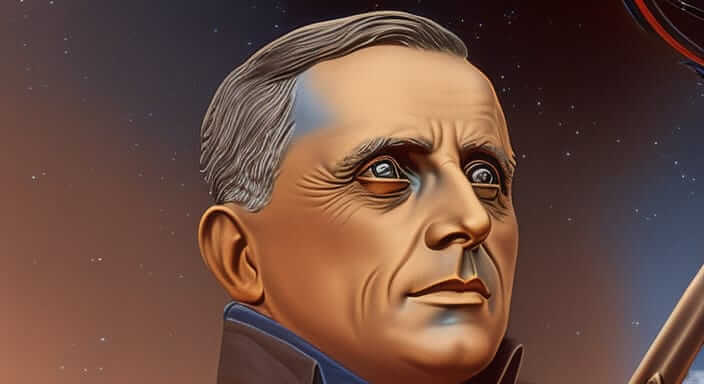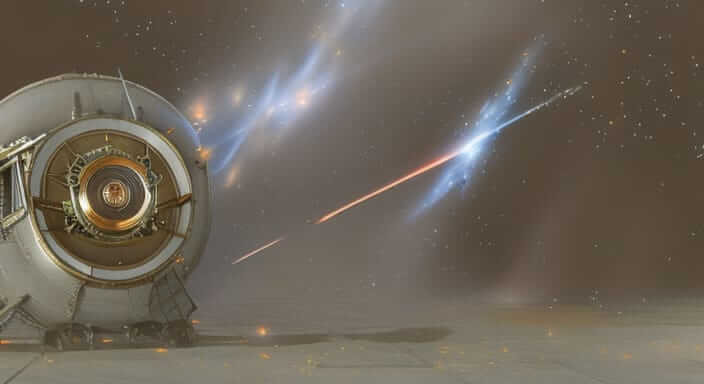Who was Edwin Powell Hubble? What did Edwin Hubble discover? Explore the remarkable life and discoveries of Edwin Hubble, the renowned astronomer whose groundbreaking work revolutionized our understanding of the cosmos. Learn about Hubble’s observations, the expansion of the universe, Hubble’s Law, and his enduring legacy in modern cosmology.

Edwin Hubble (1889-1953) was an American astronomer whose most significant contribution to science was his discovery of the expansion of the universe. He is renowned for demonstrating that galaxies are moving away from one another, providing crucial evidence for the Big Bang theory. Hubble’s observations led to the formulation of Hubble’s Law, which states that the farther a galaxy is from Earth, the faster it is receding. His groundbreaking work revolutionized our understanding of the cosmos and paved the way for modern cosmology.
Early life and education
Edwin Hubble was born on November 20, 1889, in Marshfield, Missouri, USA. He was the third of eight children born to Virginia Lee Hubble and John Powell Hubble, a businessman and insurance executive.
In his early life, Hubble displayed an interest in science and astronomy, building telescopes and conducting amateur observations. After completing his primary education in Kentucky, he attended the University of Chicago, where he excelled in both academics and sports. Hubble received a bachelor’s degree in mathematics and astronomy in 1910 and then went on to pursue a Rhodes Scholarship at Queen’s College, Oxford.
At Oxford, Hubble initially studied law but later switched to astronomy under the influence of British astronomer Arthur Eddington. In 1913, he earned his bachelor’s degree in astronomy and completed his doctoral studies in 1917 with a dissertation on the “Photographic Investigations of Faint Nebulae.”
After completing his education in Europe, Hubble briefly worked as a military officer during World War I. Following the war, he returned to the United States and embarked on his journey as a professional astronomer. He began his career at the Yerkes Observatory of the University of Chicago, where he studied various aspects of astronomy, including the properties of galaxies.
Hubble’s early life and education laid the foundation for his future contributions to the field of astronomy and the profound discoveries he would make later in his career.
Career
Edwin Hubble’s career as an astronomer was marked by groundbreaking discoveries and significant contributions to the field of cosmology. After working at the Yerkes Observatory of the University of Chicago, he joined the staff of the Carnegie Institution of Washington’s Mount Wilson Observatory in California in 1919. This move proved to be pivotal for his career.
During his time at the Mount Wilson Observatory, Hubble focused on studying distant nebulae, which were then believed to be part of our Milky Way galaxy. Using the powerful 100-inch Hooker Telescope, he observed and measured the spectra of these distant objects.
In the 1920s, Hubble made his most significant discovery: he found a correlation between the redshifts of galaxies and their distances from Earth. This observation indicated that galaxies were moving away from us, and the farther away they were, the faster they were receding. This empirical relationship became known as Hubble’s Law, and it provided crucial evidence for the expansion of the universe.
Hubble’s Law, combined with the theoretical work of Georges Lemaître, played a pivotal role in the development of the Big Bang theory of the universe’s origin. The theory proposed that the universe had a beginning, where all matter and energy originated from an incredibly hot and dense state.
In addition to his work on the expansion of the universe, Hubble made many other significant contributions to astronomy. He helped classify galaxies into different categories based on their shapes, such as elliptical, spiral, and irregular galaxies. Hubble also studied Cepheid variable stars to determine distances to galaxies accurately, which helped refine the value of the Hubble constant—a parameter quantifying the rate of the universe’s expansion.
Hubble’s discoveries and research had a profound impact on the field of cosmology and forever changed our understanding of the universe. His legacy continues to influence astronomical research and the exploration of the cosmos to this day. Edwin Hubble passed away on September 28, 1953, leaving behind a lasting legacy as one of the most influential astronomers in history.
Discoveries
Edwin Hubble’s discoveries revolutionized our understanding of the universe and played a significant role in the development of modern cosmology. Some of his most notable discoveries include:
- The Expanding Universe: Hubble’s most significant discovery was the observation of a correlation between the redshifts of galaxies and their distances from Earth. This empirical relationship, known as Hubble’s Law, indicated that galaxies were receding from us, and the more distant they were, the faster they were moving away. This provided compelling evidence for the expansion of the universe and laid the groundwork for the Big Bang theory.
- The Hubble Constant: By quantifying the relationship between the velocity of galaxies and their distances, Hubble helped establish a value for the Hubble constant. This constant quantifies the rate at which the universe is expanding and remains a fundamental parameter in modern cosmology.
- Classification of Galaxies: Hubble contributed to the classification of galaxies into different categories based on their shapes. He introduced the “Hubble sequence,” which divided galaxies into elliptical, spiral, and irregular types. This system has been refined and expanded upon by subsequent astronomers and is still in use today.
- Cepheid Variable Stars: Hubble used Cepheid variable stars, a type of pulsating star with a well-known period-luminosity relationship, to determine distances to galaxies accurately. By comparing the apparent brightness and the intrinsic brightness of these stars, Hubble could calculate the distance to the galaxies in which they resided.
- Confirmation of Other Galaxies: Hubble provided evidence supporting the idea that some “nebulae” previously thought to be part of our Milky Way galaxy were actually separate galaxies located at vast distances from us. This discovery expanded the size of the known universe and paved the way for the concept of a vast cosmos composed of billions of galaxies.
- Cosmological Principle: Hubble’s observations supported the cosmological principle, suggesting that the universe appears the same in all directions and does not have a preferred center or direction.
Overall, Edwin Hubble’s work not only confirmed the existence of a dynamic, expanding universe but also provided a solid observational foundation for the Big Bang theory, which proposes that the universe began in a hot, dense state and has been expanding ever since. His discoveries continue to shape the field of cosmology and inspire further research into the nature and evolution of the cosmos.

Honors
Edwin Hubble’s groundbreaking contributions to astronomy and cosmology earned him numerous honors and recognitions during his lifetime and posthumously. Some of the notable honors he received include:
- Bruce Medal (1938): The Catherine Wolfe Bruce Gold Medal is awarded by the Astronomical Society of the Pacific for outstanding lifetime contributions to astronomy. Hubble received this prestigious award in 1938.
- Legion of Merit (1946): Hubble was awarded the Legion of Merit by the United States government for his work during World War II. He served as a military officer during the war.
- Gold Medal of the Royal Astronomical Society (1940): In recognition of his significant contributions to astronomy, Hubble was awarded the Gold Medal of the Royal Astronomical Society in 1940.
- Henry Norris Russell Lectureship (1953): Hubble was selected to deliver the Henry Norris Russell Lectureship at the American Astronomical Society’s annual meeting in 1953, which is a prestigious honor in the field of astronomy.
- Asteroid Named After Him: In tribute to his legacy, the International Astronomical Union named an asteroid discovered in 1955 “2069 Hubble” in his honor.
- Hubble Space Telescope: The Hubble Space Telescope, launched in 1990, is named after Edwin Hubble. This iconic telescope has revolutionized astronomy and provided breathtaking images and crucial data about the universe.
- Hubble Fellowship: The Hubble Fellowship Program was established in honor of Edwin Hubble. It supports outstanding postdoctoral scientists conducting research in astrophysics.
Edwin Hubble’s work and discoveries fundamentally transformed our understanding of the universe and set the stage for modern cosmology. His legacy continues to be celebrated through these honors and the ongoing advancements in astronomy and space exploration that have been made possible, in part, by his pioneering research.
In popular culture
Edwin Hubble’s contributions to astronomy and his role in shaping our understanding of the universe have made him a prominent figure in popular culture. While he might not be as well-known to the general public as some other scientists, his name and work have appeared in various forms of media and references. Here are a few examples of Edwin Hubble’s presence in popular culture:
- Documentaries and TV Shows: Edwin Hubble’s life and work have been featured in numerous astronomy documentaries and science-related TV programs. These shows often highlight his discovery of the expanding universe and his significant contributions to cosmology.
- Astronomy Books: Hubble’s name frequently appears in books and articles about astronomy and the history of science. His work is often cited as one of the key milestones in the development of modern cosmology.
- Hubble Space Telescope: The Hubble Space Telescope, named after Edwin Hubble, has become one of the most iconic and beloved space observatories. Its breathtaking images of distant galaxies and nebulae have captured the imagination of the public worldwide.
- Astronomy Outreach: In science outreach and education efforts, Edwin Hubble’s discoveries are often used to explain the expanding universe and the Big Bang theory. His name is synonymous with the idea of the universe’s expansion.
- Astronomy Games and Apps: Edwin Hubble and his work are sometimes featured in educational astronomy games and apps designed to teach people about the cosmos and the universe’s structure.
- Quotes and Inspirational Sayings: Quotes attributed to Edwin Hubble, particularly those related to the vastness of the universe and the beauty of astronomy, are shared on social media and appear in various inspirational contexts.
- Astronomy Events and Celebrations: During events like the International Year of Astronomy (2009) or astronomy-related anniversaries, Edwin Hubble’s name and discoveries are often commemorated and celebrated.
Overall, Edwin Hubble’s name and work have left a lasting impact on popular culture through various channels. His contributions to science have become part of the collective knowledge about the cosmos and continue to inspire people to explore the wonders of the universe.